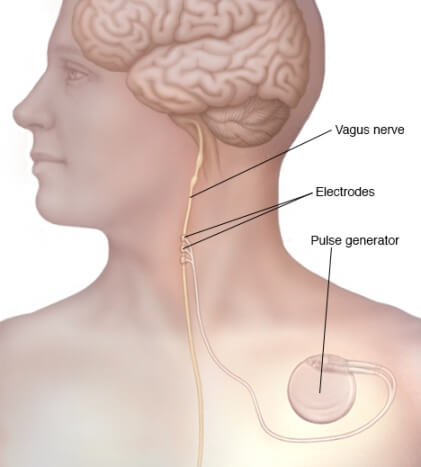Inflamed vagus nerve: Symptoms and remedies
The inflamed vagus nerve, rather than a disease itself, can be defined as one of the faces of the disorders that can affect this particular nerve in the human body. What are its symptoms? are there any remedies? Let’s look more closely at everything around this nerve and the reasons that may ignite.
The vagus nerve from the brain is responsible for controlling the parasympathetic system. It is involved in many functions, from the movements of the mouth, the heart or the fact of sweating. The vagus nerve can be affected by various dysfunctions and may, in time, trigger numerous symptoms, more or less annoying. Let’s see some basic and useful data to learn how to pay attention and easily recognize the symptoms that reveal inflamed vagus nerve.
Table of Contents
Vagus nerve: what is it and what are its functions
Unknown to the vast majority of people, the pneumogastric nerve, known as the “vagus nerve”, it is the tenth nerve in the brain, the longest in its class; it starts in the cranial box; it originates in the medulla, a part of the brainstem, which is located in the lower posterior part of the brain and descends through the neck and thorax until it reaches the abdomen. We have two vagus nerves, one to the right and one to the left of the human body.
It supplies nerve fibers to the throat area, the lungs, the heart and the digestive organs. It is the nerve that confers sensitivity to the respiratory mucous membranes (pharynx, larynx, esophagus, trachea, lungs and bronchi) and transmits rhythm, strength and frequency in breathing. It also receives signals from internal organs and sends them back to the brain.
In addition, it is the nerve that puts the diaphragm in communication with the brain, the psyche with the soma (physical body) and transmits nervousness or calmness, anger or calmness.
The protagonist of the parasympathetic system plays a very important role in the regulation of internal organs and the gastrointestinal peristalsis and sweating. In addition, it is responsible for stimulating the production of gastric acid and regulates gastrointestinal movement during the digestion. It is not only related to the muscles, but from the skull and into the abdomen, even it through the heart and stomach, vagus nerve plays a very important role in the functioning of our body.
Origin of the vagus nerve
Our autonomous nervous system is made up of two opposing systems that constantly send information to our mind. The sympathetic nervous system feeds on adrenaline and cortisol and is part of the fight or flight response; it prepares us for action; stimulates the adrenal glands and sweating.
The parasympathetic nervous system regulates the internal organs of rest, digestion and what happens to us when our body is calm.
These two systems create a tug of war in our mind. The sympathetic nervous system is aimed at sinking the foot in the accelerator since it feeds on adrenaline and cortisol and is part of the fight or flight response. The parasympathetic nervous system is the opposite pole. The vagus nerve is the central axis of the functioning of the parasympathetic nervous system. This is aimed at reducing speed and uses neurotransmitters such as acetylcholine to slow down heart rate, blood pressure and help the heart and organs to go more slowly.
Inflamed vagus nerve: Symptoms
If the vagus nerve is inflamed, functions logically affected. It may be due to what is termed as vagal syndrome, which is characterized by nausea, heartburn, dizziness, headache, tachycardia, pain and stiff neck, vomiting or vagal crisis, which directly implies heart and manifests with some uncomfortable symptoms such as excessive sweating, pallor, malaise, nausea, and even fainting.
Inflamed vagus nerve: Treatment and Remedies
Each disorder logically requires specific care. If the vagus nerve dysfunction is due to a crisis with fainting, decreased heart rate and blood pressure, it is possible that any specific drug is prescribed by the physician. In the case of problems affecting the vagus nerve is very useful called Valsalva maneuver, which takes its name from the physician and anatomist who devised it, and to be performed only by skilled hands to avoid causing more harm than good. It is a maneuver forced the hearing compensation means that helps stimulate the vague nerves of sides, right and left, in a fairly effective way.
How to stimulate the vagus nerve
One of the best ways to help us and prevent imbalances is with an ancestral diet, which mainly contains fish, vegetables, nuts and fruits, avoiding the high dependence on cereals (mainly refined wheat derivatives) of oxidized vegetable oils, of sugars, of “dairy”, of processed food, leaving periods of fasting more or less long, maintaining an active life, implementing even intense training (not strenuous).
But, because of the close relationship between the vagus nerve and the brain, the other great way to stimulate and keep it healthy is conscious breathing, relaxation, and meditation. It should be noted the importance of proper breathing when performing practices related to relaxation and meditation. Breathing not only supplies us with oxygen, but also provides us with prana or chi, which is the vital energy that keeps the energy and physical systems functioning, and which is the “earthly” representation of the subtle energies that our soul receives from the universe. Breathing is the only function of the autonomic nervous system that can be controlled and regulated by consciousness, therefore it functions as a link between the psychic and physical dimension of the human being.
The power of breathing
Deep breaths, made consciously, serve both to calm nerves before a presentation, interview or talk in public, as to put us in a state of relaxation and mental calm after a day’s work. Breathe deeply, fill the lungs to the fullest and then take out as much air as you can, several times, cleanse our body of stale air that accumulates and never comes out when we breathe superficially, and leaves us with a sensation of inner freshness that is really nice. The fact of doing all this while maintaining the concentration on the breathing process causes the mind to be occupied in the present moment, in inspiration and expiration, achieving, even for brief moments, the peace of mind necessary to enter states of mind. Expanded consciousness.
When this nerve is stimulated, the effects of relaxation and mental tranquility are produced in a more effective and profound way, which represents a basis to be able to then continue with the meditation with the format or purpose that we have marked.
Breathing and stimulation technique of the vagus nerve
The following exercise uses abdominal or diaphragmatic breathing; when this type of breathing is carried out, air is carried deeply into the lower part of the rib cage. Breathing must be done slowly and deeply, with which an adequate use of the diaphragm is made.
Process
- Inspire by the nose calmly counting mentally up to 4
- keep the air in the lungs counting to 6
- And expel it again counting up to 4, but when expelling it, we will do it as if we were fogging some glasses to clean them, that is, slightly contracting the lips, so that when exhaling, the vagus nerve is stimulated.
Both inspiration and expiration should be slow and deep. You can do the time you want, the ideal minimum would be about 7 or 8 minutes. As much as possible do it every day. In a stressful situation, for example, before an exam or job interview, the results can be surprising.
This simple practice, performed regularly, not only gives us a natural abdominal breathing but also stimulates the vagus nerve, allowing us to enjoy and collect the benefits of mental relaxation and the process of meditation that we do next.
There are other ways that help stimulate the nerve:
- Hold your breath.
- Put a cool wet cloth on your face.
- Press vigorously on the eyes.
- Drink a glass of cold water quickly.
- Lie down with your head down.
- Contract the abdomen.
- Inspire deeply by swelling the belly to oxygenate the blood.
- Relaxation and meditation.
The results of this stimulation can be amazing if we practice it when we feel stressed or in a moment of overwhelm.
In addition, the long-term stimulation of the vagus nerve can repair some organs, lowers blood pressure, improves heart rate, increases brain volume, improves immune function, fixes the nervous system, reduces anxiety, stress and depression.

